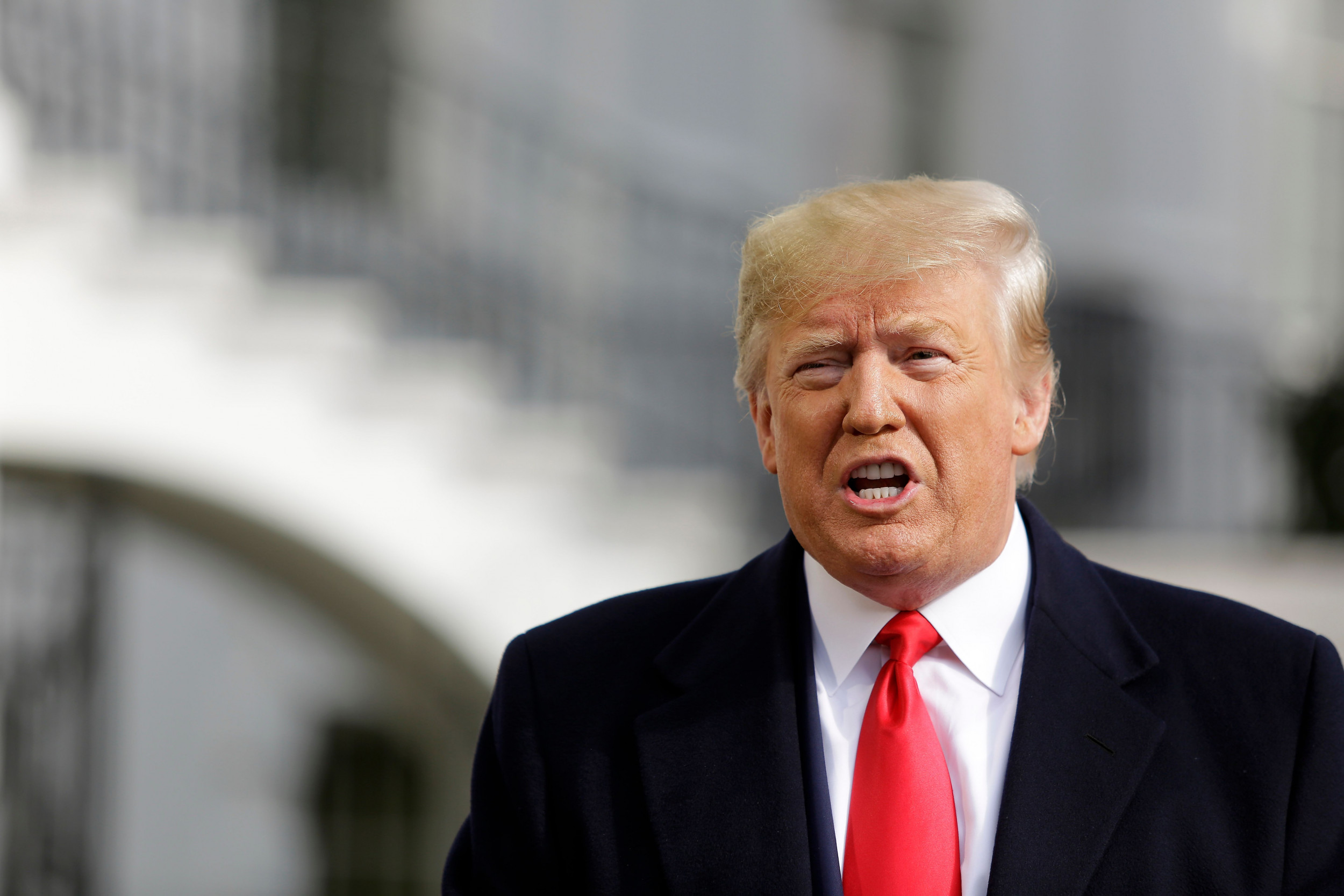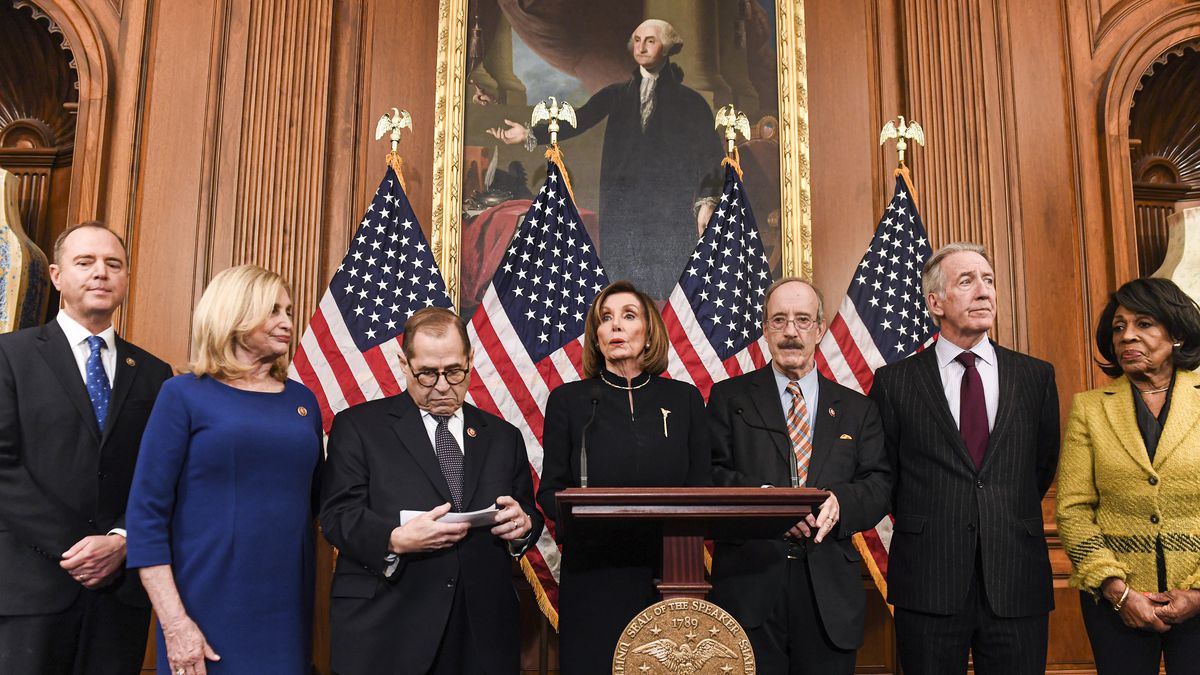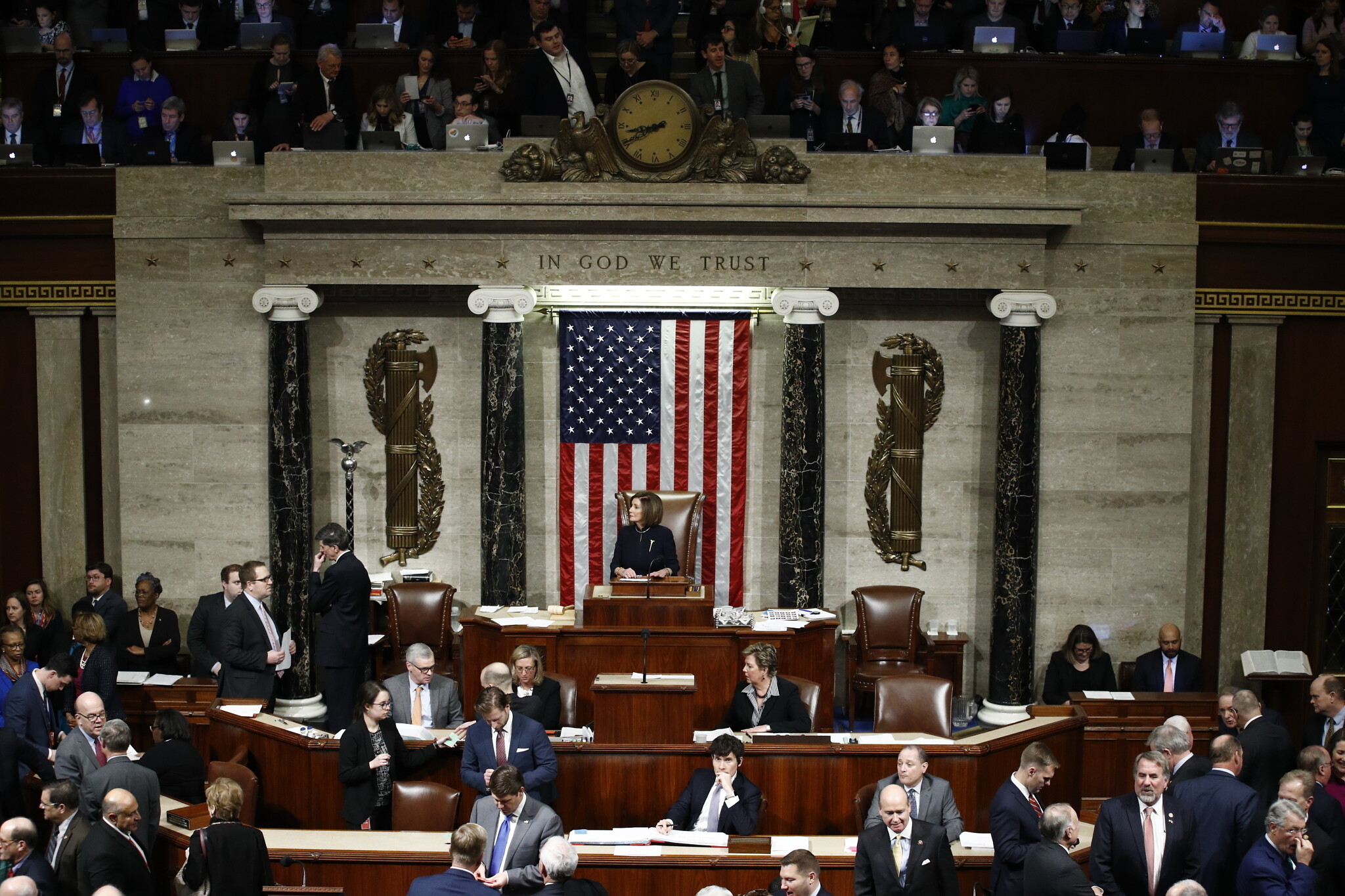Donald Trump became Wednesday the third president of American history who will be subjected to an impeachment. A fully divided House of Representatives approved bringing Trump to trial in the Senate for abuse of power and obstruction of Congress following a scandal of pressure on Ukraine to obtain electoral benefits. After a long and sullen debate, at times theatrical, the Democratic majority voted in favor of the two charges and all Republicans against, in a clear reflection of the partisan, almost tribal, of this process.
The founders of the Constitution devised it to remove a president in case of “serious crimes or misdemeanors.” His heirs have transformed it into a war without quarter.
Resolution 755 to judge the president of the most powerful country in the world came to light after eight o’clock at night, after a Wagnerian day at the Capitol. They were more than 11 hours of debate, pure train crash, about the so-called impeachment articles. The abuse of power went ahead with 230 votes in favor and 197 against (195 Republicans and two Democrats) and the obstruction to Congress, with 229 in favor and 198 against (three Democratic defections and one abstention). These are centrist legislators, in hinge territories, where a vote in favor can pass a political invoice.

Some began to applaud after the first vote, which did not please the president of the House, veteran Democrat Nancy Pelosi, who raised her hand and cut them dry with a stern look. Third authority of the country and leader of the Democrats in Washington, Pelosi had come dressed in dark and talked in a calm and serious tone, trying precisely to convey an idea of institutional solemnity that counteracts the criticism of Trump and the Republicans, who accuse the opposition of acting for political revenge.

The case broke out in September when Trump’s pressures transcended the Kiev government to initiate investigations that favored him electorally. In her initial intervention, Pelosi described the president as “continuing threat to national security.” “We are here to defend the democracy of the people,” she added.
It was a day of grandiloquent phrases and also rude phrases, demonstrations in the street and on social media. Lawmakers reminded the founding fathers and the president asked the citizens to pray. American politics was about to write an important chapter in its history. And yet, a strange sense of calm has dominated this process since it began, despite the usual astrakhanas of the president. It is not only because his acquittal is taken for granted in the Senate, given the Republican majority, but because his presidency has been installed in the storm since the day he arrived at the White House.
Only a leader as unusual as Trump can make an impeachment look like another day in the office. Before even swearing in the charge, the Russian plot scandal broke out and people began talking about starting a dismissal process, something very unusual in the history of the United States. The independent investigation found no evidence of his collusion with the Kremlin, but revealed his attempts to torpedo the investigations, laying the groundwork to accuse him of obstruction. He is also suspected of a crime of illegal campaign financing for payments to a woman to silence his alleged sexual relations a few weeks after the 2016 elections and is in the spotlight for accepting money from foreign governments through his hotel empire .

All these conflicts have been shaking three years of Administration that, in itself, has broken all imaginable protocols and has turned the president’s attacks and insults into the usual tonic.
The Ukrainian crisis quickly combusted. An anonymous informant, employed in the US government, denounced in the summer that Trump was pressuring the Ukrainian president, Volodímir Zelenski, blocking even 391 million dollars in military aid, to get him to announce two investigations that would benefit him electorally in the 2020 presidential elections. He also used an invitation to the White House as a hook.
Specifically, Trump claimed inquiries about Joe Biden, a Democratic candidate, and his son, Hunter, who was paid by a gas company in that country when his father was vice president. The other inquiry he was asking for was a discredited theory that there was an interference campaign launched from Ukraine in the 2016 US presidential elections to favor Democrats. Trump is now accused of abusing power for these maneuvers and of obstructing Congress for having boycotted this process, denying the delivery of 71 documents or the declaration of 12 members of the Administration.
Doug Collins, a pastor from Georgia, was one of the first to speak on Wednesday and insisted that Democrats seek to dismiss Trump from day one and don’t care about the facts and the evidence. “Today is a day for impeachment, but it is not a day for truth,” he emphasized. The argument of Trump and the Republicans is that he worried about corruption in good faith and that there was no quid pro quo. This Wednesday, in full debate, Trump wrote in his Twitter account, in capital letters and several exclamation points: “What a heinous lies of the radical left! (…) This is an attack on America and the Republican Party! ”
SUCH ATROCIOUS LIES BY THE RADICAL LEFT, DO NOTHING DEMOCRATS. THIS IS AN ASSAULT ON AMERICA, AND AN ASSAULT ON THE REPUBLICAN PARTY!!!!
— Donald J. Trump (@realDonaldTrump) December 18, 2019
At the trial, which will take place in the Senate after the green light of the lower house, legislators are required to review the testimonies, call new witnesses if they see it necessary, examine the documents, the evidence and decide whether, in effect, the president of the United States has committed some “crime or serious offense”, as the Constitution says, that makes his removal necessary. The dates are not clear, as Pelosi told the dam that he will not transfer the items until the basis of what the trial will be like. For the White House, this Wednesday has meant “the culmination of one of the most shameful political episodes of our nation.”
Senators are obliged to make their decisions regardless of the political color of the president they are judged, but the deliberation seems like a pantomime. The bulk of Democratic lawmakers see Trump guilty and all Republicans consider him innocent. For the White House, this Wednesday has meant “the culmination of one of the most shameful political episodes of our nation.” In the Senate, with 53 Republican senators out of 100, absolution is tied, since a guilty verdict requires a two-thirds majority.
One of the great conclusions of this process is that the Republican remains the party of Donald Trump. The formation has closed ranks with the president. However, in the impeachment of Bill Clinton, initiated on December 19, 1998 – almost 21 years ago – by the Lewinsky scandal, 31 Democrats voted to initiate the investigation of the Democrat. Another Democrat, Andrew Johnson, who submitted to the political trial in 1868, surpassed him in the Senate by a single vote.

Trump’s moment of truth will arrive in November 2020. His base, for now, does not seem affected by this scandal. Its approval rating, despite the low, has improved six points since September, up to 45%, according to Gallup. At night, there was a mass bath at a rally in Michigan. On the street the rain of the last days gave a truce in Washington and under an intense sun, but an atrocious cold, the protests against Trump in the morning remembered that other part of America.




